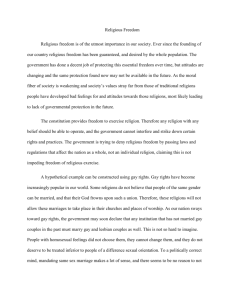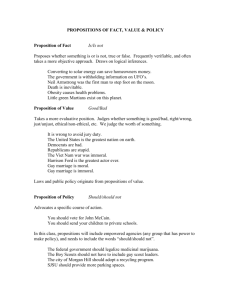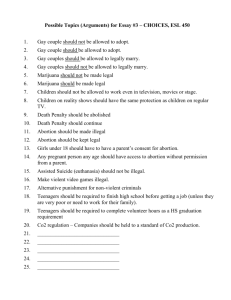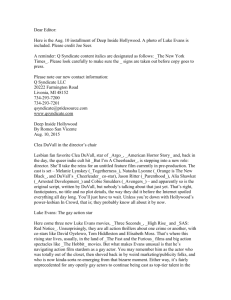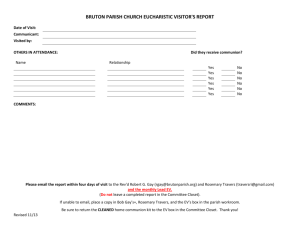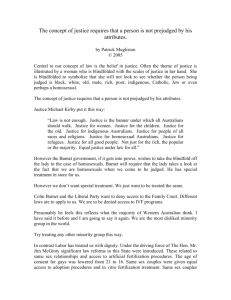The Modern Pleasure Island
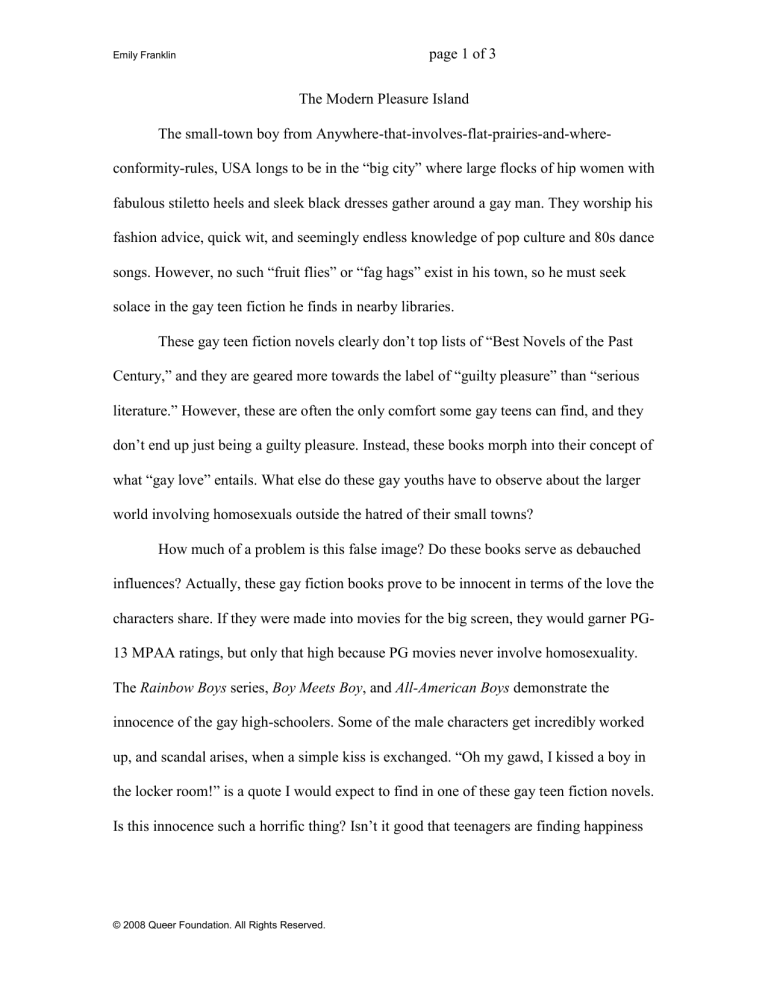
Emily Franklin page 1 of 3
The Modern Pleasure Island
The small-town boy from Anywhere-that-involves-flat-prairies-and-whereconformity-rules, USA longs to be in the “big city” where large flocks of hip women with fabulous stiletto heels and sleek black dresses gather around a gay man. They worship his fashion advice, quick wit, and seemingly endless knowledge of pop culture and 80s dance songs. However, no such “fruit flies” or “fag hags” exist in his town, so he must seek solace in the gay teen fiction he finds in nearby libraries.
These gay teen fiction novels clearly don’t top lists of “Best Novels of the Past
Century,” and they are geared more towards the label of “guilty pleasure” than “serious literature.” However, these are often the only comfort some gay teens can find, and they don’t end up just being a guilty pleasure. Instead, these books morph into their concept of what “gay love” entails. What else do these gay youths have to observe about the larger world involving homosexuals outside the hatred of their small towns?
How much of a problem is this false image? Do these books serve as debauched influences? Actually, these gay fiction books prove to be innocent in terms of the love the characters share. If they were made into movies for the big screen, they would garner PG-
13 MPAA ratings, but only that high because PG movies never involve homosexuality.
The Rainbow Boys series, Boy Meets Boy , and All-American Boys demonstrate the innocence of the gay high-schoolers. Some of the male characters get incredibly worked up, and scandal arises, when a simple kiss is exchanged. “Oh my gawd, I kissed a boy in the locker room!” is a quote I would expect to find in one of these gay teen fiction novels.
Is this innocence such a horrific thing? Isn’t it good that teenagers are finding happiness
© 2008 Queer Foundation. All Rights Reserved.
Emily Franklin page 2 of 3 in books where characters only kiss? Of course, nothing is wrong with it! However, if you compare these books to the outside world, problems arise.
What happens when the naïve, small-town gay boy goes off in search of
“tolerance” and “love” in a larger city, especially one nicknamed a “gay ghetto?” What if they stumble upon the mystical sidewalks of West Hollywood or Castro? Will they be prepared?
No.
These young newcomers have spent their life in a small-town yearning to escape and experience the “tolerance” of a gay city. They’ve read the cutesy, borderline-sappy gay fiction stories that kept them hopeful throughout high school. They can’t wait to have a boyfriend who holds their hand in public and kisses them in the rain. They want the romance associated with the flamboyant homosexual love they’ve grown accustomed to in their books.
Suddenly, they are thrust into the big city lights where sex is the currency, getting you fed, clothed, and a bed for the night. The gay metropolises, including West
Hollywood and Castro, are hyper-sexualized to the point of infamy. Santa Monica Blvd. is known as the street to go to if you would like some hired lovin’ for the night, or a few quick bucks for something you’d be doing for free in the clubs anyway. Sex stores line the boulevard, as well as theatres showing porno until 5 a.m. in the morning. In the queer dance clubs, a heavy beat is synonymous with carnal pleasure.
The once innocent gay youth is thrown into the dirty underbelly of the city, and they are now thrusting with the best of them. Because the youth are so unprepared for this
© 2008 Queer Foundation. All Rights Reserved.
Emily Franklin page 3 of 3 sudden departure into the city-wide obsessions with sex, they are uneducated and unsafe.
How do they know their limits? Their limits have never been tested before. Do they know how to properly protect themselves? Do they know the consequences of what they are doing? Sex comes in as many different flavors of ice cream as it does at the parlor down the street, but the youth no longer eats ice cream, of course, as they are now attempting to attract the male attention for sex, and lean beats out pudgy any day in the over-sexed nightlife scene of West Hollywood.
In literary and pop culture terms, this small-town-boy-becomes-piece-of-meat phenomenon can be related to the story of Pinocchio. All the little boys seemed so jolly and happy-go-lucky to be rid of the responsibilities of their former life. Their lives on
Pleasure Island involved cotton candy, popcorn, games, and not much else, and their innocence stayed intact. However, Pleasure Island quickly turned sinister, and the boys possessed no way of coping with their new situation. Their innocence was shattered, and they were transformed into animals, slaving away in their new world. The gay youth in these hyper-sexualized metropolises also transform, though metaphorically, into animals.
Instead of the emotional feeling involved in “lovemaking,” all they feel is animalistic, primal lust, the same lust a dog experiences when he humps your leg. These stereotypical sex-crazed gay teens are now made over to be the slaves to the system, tools of sex, and faceless bodies in a sea of mediocrity. West Hollywood is its own brand of sinister
Pleasure Island.
The gay youth have no middle ground, between the innocence of high school love and the community obsession with sex. The teens need a level between the two, to prepare them for the imperfect lives led in the city.
© 2008 Queer Foundation. All Rights Reserved.

